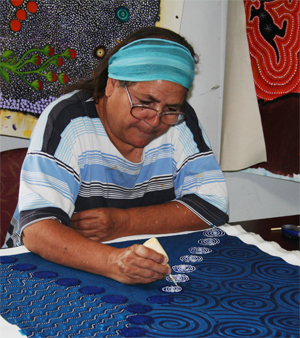Christine Tschuna – What to do if you don’t get paid – letters of demand

Christine Tschuna is an Wirangu artist with the Ceduna Arts and Cultural Centre. In June 2006 she signed a Licence Reproduction Agreement with a company with produces postcards and tourist memorabilia. This contract gave the company a non-exclusive licence to reproduce her designs for the next five years in return for a royalty to be paid to Christine.
During 2009 Christine forwarded several original paintings to the company to be sold in its gallery with a verbal agreement that these could be sold in the company’s gallery as well as giving permission for the art work to be reproduced in accordance with the Licence Reproduction Agreement. Some time passed without any report from the company. The company said that payment was “in the post”. Later they said her paintings had been lost! Eventually they simply did not return the art centre’s calls or emails.
Eventually Christine turned to Artists in the Black for assistance. Arts Law pro bono lawyer Robert Lempens of Camatta Lempens in Adelaide offered to help Christine. His firm discovered that the company had become deregistered and may have already been deregistered when the artworks were forwarded to it in 2009. Additional enquiries revealed that former directors of the company had established a partnership business in 2008. After checking further business records with the website business.gov.au the partnership’s new address was located and a letter of demand was sent to them. A letter of demand is the first step before legal proceedings are commenced. If the letter of demand is successful in getting the debtor to pay up, legal proceedings are not necessary. In this case, the letter of demand had the result that in March 2010 Christine received a cheque for the money owing to her together with the remaining artworks which had not been sold.
This case highlights that whenever an artist or art centre forwards paintings to a company or partnership, they should first check to ensure that the company is registered. If art works are handed to a company with no written documentation, there is a chance that if the company is unregistered or goes into liquidation, the artist may lose not only the artwork but also the profits from any previous sale. Artists and art centres should always know whom they are dealing with, and record any transactions in writing.
In addition, when polite enquiries and reminders have failed, a strongly worded legal letter of demand may be effective to persuade the debtor to pay up.
Further resources you might find useful:
- AITB contracts information sheet and comic
- Arts Law’s information sheets: debt recovery
Camatta Lempens are valued supporters of Artists in the Black. Their website is www.camattalempens.com.au